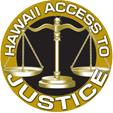Q. Why is Access to Justice important?
A. Each of us in Hawaii has a stake in ensuring that all residents have equal access to justice. When access to justice is denied, justice becomes a mere illusion perceived as available only to those who can pay for it. Such a situation undermines a rule of law that is premised on the principle that all individuals stand equally before the law.
Q. Why does Hawaii need an Access to Justice initiative?
A. In 2007, the Access to Justice Hui, a group comprising representatives from several legal organizations, found:
- Only 1 in 5 low and moderate-income Hawai‘i residents have their legal needs met.
- Legal service providers are able to help only 1 in 3 of those who contact them for
assistance. - The areas with the greatest unmet civil legal needs are housing (24%), family (23%),
domestic violence (8%), and consumer (7%). - Significant barriers to obtaining legal assistance, in addition to inability to afford an
attorney, include language and cultural barriers, lack of knowledge of one’s legal rights,
lack of knowledge of available legal services, and difficulty in accessing legal services
programs. - There is one legal service attorney for every 2,291 persons living below 125% of the
federal poverty guideline. - There is one legal service attorney for every 4,402 persons living below 200% of the
federal poverty guideline. - There is one private attorney for every 361 persons in the general population.
Q. Why did the Supreme Court establish an Access to Justice Commission?
A. The Access to Justice Hui, in response to their findings, generated a Community Wide Action Plan containing ten “Action Steps” to increase access to justice in Hawaii by 2010. Action Step one was to form an Access to Justice Commission that would “provide ongoing leadership and oversee efforts to increase funding and improve delivery of legal services to low-income residents.”
Q. Who serves on the Access to Justice Commission?
A. On April 24, 2008, the Hawaii Supreme Court formally adopted Rule 21 of the Rules of the Supreme Court of the State of Hawaii, which established the Access to Justice Commission. The Commission consists of 22 members who are appointed by different entities. The Chief Justice appoints five members, consisting of the Chief Justice or an Associate Justice of the Supreme Court and four other judges from different judicial circuits, including at least one circuit court judge, one family court judge, and one district court judge. The Hawaii State Bar Association (HSBA) appoints four members, including two representatives of the HSBA and two active HSBA members. The Hawaii Consortium of Legal Services Providers (HCLSP) appoints six members to the Commission, including four representatives of Hawaii nonprofit legal services providers, and, in consultation with the Chief Justice, two non-attorney public representatives. The Hawaii Justice Foundation (HJF) appoints one member to the commission, as does the University of Hawaii, William S. Richardson School of Law and the Hawaii Paralegal Association (HPA). Finally, the Governor of Hawaii, the Attorney General of Hawaii, the President of the Hawaii Senate, and the Speaker of the Hawaii House of Representatives are each entitled to serve on the Commission or to appoint one member from each of their respective branches of government.
Q. What are the objectives of the Access to Justice Commission?
A. Rule 21 sets out fourteen Commission objectives. Those objectives are to:
|
(1)
|
Provide ongoing leadership in expanding and improving delivery of civil legal services to low-income people in Hawaii; |
|
(2)
|
Develop and implement initiatives to expand access to justice; |
|
(3)
|
Develop and publish a strategic plan for delivery of civil legal services; |
|
(4)
|
Increase and stabilize long-term funding for delivery of civil legal services to lowincome Hawaii residents; |
|
(5)
|
Facilitate efforts to improve collaboration and coordination among civil legal services providers; |
|
(6)
|
Increase pro bono contributions by Hawaii attorneys; |
|
(7)
|
Reduce barriers to the civil justice system; |
|
(8)
|
Encourage lawyers, judges, government officials, and other public and private leaders in Hawaii to take a leadership role in expanding access to civil justice; |
|
(9)
|
Educate governmental leaders and the public about the importance of equal access to justice; |
|
(10)
|
Increase effective utilization of paralegals and other non-lawyers; |
|
(11)
|
Increase support for self-represented litigants; |
|
(12)
|
Develop initiatives to enhance recruitment and retention of attorneys who work for nonprofit civil legal services providers and to encourage law students to consider, when licensed, the practice of poverty law in Hawaii; |
|
(13)
|
Encourage the formation of a broad coalition of groups and individuals to address ways of alleviating poverty; and |
|
(14)
|
Conduct a statewide assessment of unmet civil legal needs five years after the Commission’s first progress meeting. |
Q. How does the Commission do its work?
A. The Commission has the following subject matter committees to facilitate its work:
- Committee on Education, Communications, and Conference Planning
- Committee on Increasing Pro Bono Legal Services
- Committee on Initiatives to Enhance Civil Justice
- Committee on Maximizing the Use of Available Resources for Separating and Divorcing Families in Hawai`i
- Committee on Overcoming Barriers to Access to Justice
- Committee on Paralegals and Other Non-Lawyers
Each committee is chaired by a commissioner, and persons interested in serving on a committee may send an application and resume by email to Judge Joseph E. Cardoza, Chair of the Hawai`i Access to Justice Commission at <joecmaui@earthlink.net>.
APPLICATION FOR COMMITTEE MEMBERSHIP (fillable)
Q. Where can I find more information on Access to Justice in Hawaii?
A. The online presence of the Hawaii Access to Justice Commission is currently at https://www.hawaiijustice.org/hawaii-access-to-justice-commission. There, you can review founding documents such as the Access to Justice Hui’s final report, Supreme Court Rule 21, details about the committees and commissioners, and other information.
